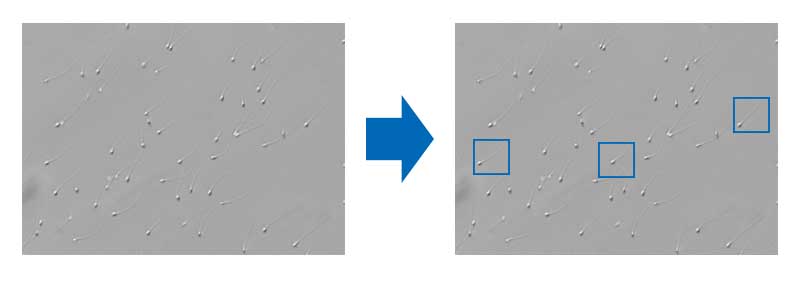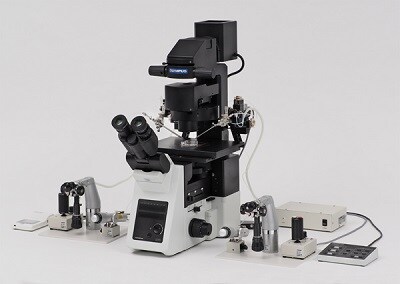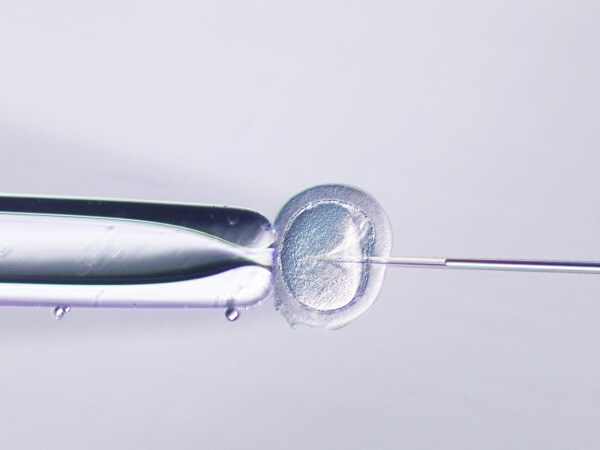New Collaboration between Olympus and the Jikei University School of Medicine to Develop AI-Assisted Sperm Selection Aims to Reduce the Workload in Intra Cytoplasmic Sperm Injection (ICSI)Research will make it easier for embryologists to select good sperm
March 8, 2019

Image of AI-assisted sperm selection system
recognize and display good-quality sperms in real time.

The ICSI system is based on the Olympus IX3-SLICSI inverted microscope
This ICSI system realizes fast, accurate operation. With the push of a button, an operator can easily switch to between the observation methods and magnifications necessary for ICSI. It features a spindle observation function that can instantly determine the maturity of an oocyte, which is important for ICSI.
Olympus Corporation (President: Hiroyuki Sasa) is participating in a collaborative ICSI research project with the Jikei University school of Medecine (President: Senya Matsufuji). This program aims to reduce the workload in ICSI and standardize the process by developing artificial intelligence (AI)-assisted sperm selection, which supports embryologists*1 in selecting good-quality sperm.
Worldwide, infertility rates have climbed over the past several decades. In response, the need for assisted reproductive technology, including in vitro fertilization, has increased, and the number of patients undergoing ICSI, which is performed under a microscope, has also risen. Today, male infertility factors, such as oligoasthenozoospermia, are also drawing attention. In ICSI, a single sperm is injected into an oocyte, making the quality of the sperm selected by the embryologist essential. To minimize stress to the oocytes, embryologists must quickly select the highest quality sperm out of many others. Accordingly, two challenges are to reduce embryologists’ workloads and standardize the process among embryologists at facilities conducting IVF.
Olympus’ Scientific Solutions Business is embarking on a joint collaborative research project with the department of obstetrics and gynecology at the Jikei University School of Medicine to help solve these challenges. The research will use up to 10,000 cases of training data derived from 1,000 patients. The motility and morphology of the sperm head will be comprehensively evaluated so that the AI can learn the criteria needed to select good-quality sperm. Our goals are to develop an AI-assisted sperm selection system and deploy a microscope equipped with this technology by December 2020. This microscope system will be able to recognize and display good-quality sperms in real time, helping streamline embryologists’ selection workflow. Ultimately, this microscope system will reduce the ICSI workload and realize greater standardization within the process. The resulting improved quality of ICSI will contribute to society by helping reduce the mental, physical, and economic burdens for people around the world who wish to have children.
*1 Medical technicians who operate assisted reproductive technology, including ICSI and in vitro fertilization under the guidance of physicians.
Background of the collaborative research
In recent years, the number of patients requiring infertility treatment has been steadily increasing. In 2016, approximately 450,000 persons underwent treatment with assisted reproductive technology in Japan, and approximately 54,000 babies (one out of 18 births) were born through in vitro fertilization. Both figures are record highs. Olympus’ Scientific Solutions Business views increasing infertility as an important challenge and provides solutions that contribute to this research. In the field of reproductive medicine, microscopes play a key role in in vitro fertilization research. Olympus provides the IX3-SLICSI inverted microscope ICSI system to enable operators to perform fast and accurate observation and engineering.
The Jikei University School of Medicine provides a wide range of infertility treatments, including ICSI. The number of ICSI cycles has been substantially extended in proportion to the increased demands for infertility treatment, greatly increasing the workload for embryologists. Moreover, in ICSI, sperm-selection criteria vary depending on the knowledge and experience of the embryologist selecting the sperm, leading to different results among embryologists in terms of their selection accuracy and time spent performing the procedure. This collaborative research program is aimed at addressing these challenges.
About the department of obstetrics and gynecology, the Jikei University School of Medicine
The department of obstetrics and gynecology, which marked its 115th anniversary in 2018, has 151 medical staff (as of January 2019), making it one of the largest OB-GYN departments in Japan. In the university’s 4 hospitals and 15 related hospitals/institutions, the Jikei University School of Medicine has conducted extensive clinical research in obstetrics, gynecology, reproduction and endocrinology. The outpatient department specializing in infertility works closely with other hospital departments and is dedicated to helping patients become parents. The outpatient department also has extensive clinical experience in handling difficult cases and providing advanced medical treatment.
About ICSI
ICSI is an assisted reproductive technology method in which oocytes and sperms removed from the body are fertilized in vitro. The oocyte is injected with a sperm under an inverted microscope. This method is effective in cases of fertilization failure and cases with male infertility factors, including oligoasthenozoospermia; it is often viewed as the final stage of infertility treatment. The number of cases undergoing ICSI has been increasing around the world.

The oocyte is injected with a sperm under an inverted microscope.
Press releases are company announcements that are directed at the news media.
Information posted on this site is current and accurate only at the time of their original publication date, and may now be outdated or inaccurate.

